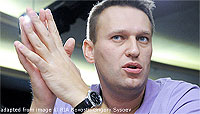Coming clean: As Navalny’s trial looms, it’s time for a reality check

(Moscow News – themoscownews.com – April 8, 2013 – Anna Arutunyan)
Anna Arutunyan is an editor and correspondent at themoscownews.com
Coming back from a monthlong break, I’ve seen a flurry of activity. There’s an anti-corruption drive that’s either meant to curb capital flight or get a better grip on State Duma deputies, the court date for Alexei Navalny’s embezzlement trial has been set (and he has revealed that he wants to be president); there were the raids on NGOs and a couple of oppositionists, there was an authorized protest rally of about 1,500 over the weekend demanding that authorities release political prisoners, and President Vladimir Putin signed a bill outlawing cursing in the media.
(That last one is actually a bummer, because I’m having a hard time picking the right words as it is.)
But none of this is really news. In fact, not much is happening. And not much has been happening for quite some time.
When my friends in the whiteribbon crowd learned of Navalny’s pending trial and his calls to take to the streets they were lukewarm and skeptical. They don’t expect that a lot of people are now going to risk turning out in support of a political leader who waited so long to admit that he was a political leader, and whose leadership didn’t help many of those now being prosecuted for finding themselves in the wrong place at the wrong time last May on Bolotnaya Ploshchad, when a peaceful rally turned violent.
I don’t want to blame Navalny; he was just one of several protest leaders, including deputies of the Duma, who ultimately proved powerless in getting any of the political prisoners they are now rallying for out of jail. And it’s not that they didn’t try. It’s that on the other side of the equation looms an unpleasant reality that isn’t news, either, but that we have to remind ourselves of: repressions tend to work.
Let’s take a reality check. According to a poll by the Levada Center released last month, just 9 percent of respondents marked “democracy and the protection of individual rights and freedoms” as a top priority for Putin. It’s not the small number in itself that is significant, but the fact that it has gone down from 13 percent in 2006. Fighting corruption, something that the government is talking about all the time, is a much bigger issue (46 percent), to say nothing of economic growth (53 percent).
Perceptions about democracy are also telling: fewer (27 percent) say they want a “Western-type” democracy, more (38 percent) prefer a “special” kind of democracy that has been touted in Russia by its government.
But when asked what they understood by democracy, relatively few (26 percent) identified it as free elections. Even fewer (19 percent) identified it as the government staying out of their private lives. For most, democracy meant equality before the law (40 percent), freedom of speech (40 percent) and a government that takes care of its people (35 percent).
What really stands out, if you look at the figures long enough, is that they reflect pretty much what the government says people should think.
This is a unique phenomenon, and it carries over from Soviet times. The difference, of course, is that the current amount of pluralism in these polls is unprecedented. But that’s a reflection of the government’s pluralism: one arm is creating obstacles for NGOs, the other arm is using recommendations on how to fight corruption from the same NGO it is raiding.
The government, in other words, is playing just as big a role in determining what people think as it was before, without really making much effort to. Even journalist Oleg Kashin, who joined the opposition, admitted in a column last week that he was succumbing to paranoia that the whole protest movement was organized by Kremlin agents.
As the one-year anniversary of the ill-fated May 6 rally approaches, we’re not just asking ourselves what happened. What we’re asking is whether anything happened at all.
